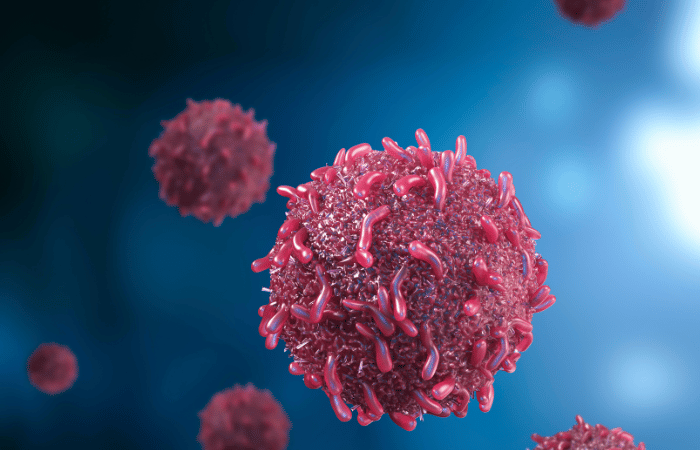
CAR T-Cell Therapy in autoimmune disorders
Autoimmune disorders, characterized by the immune system’s assault on the body’s own tissues, pose a formidable medical conundrum. Conventional treatments, including immunosuppressive drugs, often entail severe side effects and variable efficacy.
However, recent strides in immunotherapy have unveiled novel pathways for addressing these conditions. One such auspicious approach is Chimeric Antigen Receptor (CAR) T cell therapy, initially devised for cancer treatment but now under exploration for autoimmune disorders.
Understanding CAR T Cell Therapy
CAR T cell therapy changes the genes of a patient’s T cells so that they express chimeric antigen receptors (CARs), which find specific antigens on diseased cells and attack them. These engineered T cells are subsequently reintroduced into the patient, where they actively seek out and obliterate cells expressing the target antigen. This personalized intervention leverages the body’s immune system to combat diseases more efficiently.
In the realm of cancer, CAR T cell therapy has exhibited remarkable success, notably in hematological malignancies such as acute lymphoblastic leukemia (ALL) and specific lymphoma types. The potential to adapt this technology for autoimmune disorders lies in its precision in targeting and eradicating autoreactive immune cells, thereby reinstating immune equilibrium.
Mechanism of Action
CAR T cells are crafted by isolating a patient’s T cells and introducing a gene encoding the CAR. The CAR comprises several components:
- An extracellular domain that identifies and binds to the target antigen.
- A transmembrane domain that secures the receptor to the cell membrane.
- An intracellular signaling domain that activates the T cell upon antigen binding, instigating its cytotoxic response.
Target antigens in autoimmune disorders frequently include those that autoreactive B cells or other pathogenic immune cells express. By tailoring CARs to recognize these specific antigens, researchers aim to eradicate the cells propelling the autoimmune response without jeopardizing healthy tissues.
CAR T in Autoimmune Disorders
The utilization of CAR T cell therapy in autoimmune disorders is still nascent, yet several promising domains have been delineated:
- Systemic Lupus Erythematosus (SLE)
SLE is a complex autoimmune disease in which the body makes autoantibodies that attack many different types of self-antigens. This causes inflammation all over the body and damage to tissues. Early research has shown that CAR T cells that target CD19, a marker on B cells, can effectively remove autoreactive B cells from lupus models, lowering the disease’s activity. - Rheumatoid Arthritis (RA):
In RA, autoreactive B cells and T cells contribute to joint inflammation and degradation. CAR T cell therapy aimed at these autoreactive cells has the potential for enduring remission. Tests done on animals have shown that CAR T cells that are specific for CD19 or other B cell markers can greatly reduce inflammation and joint damage. - Multiple Sclerosis (MS):
MS entails an immune-mediated onslaught on the central nervous system, primarily steered by autoreactive T cells. Targeting these T cells with CAR T cell therapy could provide a means to impede disease progression. Research is ongoing to pinpoint suitable antigens for CAR design in MS. - Type 1 diabetes (T1D):
T1D ensues from the autoimmune annihilation of insulin-producing beta cells in the pancreas. While the primary emphasis has been on B cells, there is burgeoning interest in formulating CAR T cells targeting autoreactive T cells accountable for beta cell destruction. Preliminary research manifests promise in preclinical models.
Challenges and future direction
Despite the potential, several hurdles must be surmounted to render CAR T cell therapy a feasible choice for autoimmune disorders:
- Target Identification:
Identifying suitable target antigens specific to autoreactive immune cells without affecting normal cells is pivotal. The heterogeneity of autoimmune diseases introduces intricacy to this endeavor, necessitating extensive research to ensure specificity and safety. - Safety Apprehensions:
The peril of off-target effects and cytokine release syndrome (CRS) looms large. CAR T cell activation can cause CRS, an intense inflammatory response, which could be fatal. Strategies to alleviate these risks, such as regulated CAR T cell activation and the formulation of safety switches, are under scrutiny. - Immune Evasion:
Autoreactive immune cells might evolve strategies to elude CAR T cell detection. Merging CAR T cell therapy with other immunomodulatory approaches could amplify efficacy and avert relapse. - Manufacturing and Cost:
The intricacy and cost of fabricating personalized CAR T cells pose substantial barriers. Progressions in scalable production techniques and cost curtailment strategies are imperative for broader accessibility.

Recent Progress and Clinical Trials
The domain of CAR T cell therapy for autoimmune disorders is swiftly evolving, with several pivotal advancements:
- Clinical Trials in SLE:
New clinical trials using CD19-targeted CAR T cells in people with refractory SLE have shown promising results. These studies evinced a notable reduction in autoantibodies and disease activity, underscoring the potential for enduring remission. - Innovative CAR Designs:
Researchers are delving into novel CAR designs to augment specificity and diminish side effects. For instance, dual-targeting CARs mandating recognition of two antigens for activation can refine precision and safety. - Regulatory T Cells (Tregs):
Modifying regulatory T cells (Tregs) to express CARs offers an innovative approach to reinstating immune tolerance. CAR-Tregs can suppress autoreactive immune responses, providing a potential therapeutic strategy for an array of autoimmune disorders. - Allogeneic CAR T Cells:
Formulating off-the-shelf CAR T cells from healthy donors (allogeneic CAR T cells) could surmount the challenges of personalized therapy. Gene editing tools like CRISPR are making it easier to make universal CAR T cells that have a lower risk of graft-versus-host disease (GVHD).
Future Perspectives
The future of CAR T cell therapy in autoimmune disorders appears promising, with ongoing research and clinical trials paving the way for fresh treatments. Key areas of concentration encompass:
- Personalized Medicine:
Genomics and proteomics are making it easier to find disease-specific targets, which makes it possible to make CAR T cell therapies that are specifically designed for each patient. - Combination Therapies:
Merging CAR T cell therapy with other immunomodulatory treatments, such as checkpoint inhibitors or cytokine therapies, may amplify efficacy and diminish the risk of relapse. - Enhanced Safety Profiles:
Formulating safer CAR constructs and integrating safety switches will be pivotal in minimizing adverse effects and rendering the therapy more universally applicable. - Expanded Indications:
As comprehension of autoimmune pathogenesis deepens, CAR T cell therapy could be applied to a broader array of autoimmune disorders, providing new hope for patients with conditions that are presently arduous to treat.
Conclusion
CAR T cell therapy embodies a pioneering approach in the management of autoimmune disorders, proffering the potential for targeted, enduring remission. While challenges persist, ongoing research and clinical strides are steadily surmounting these impediments, bringing the promise of CAR T cell therapy closer to fruition for patients grappling with autoimmune diseases. As the field advances, it has the potential to transform the management of autoimmune disorders, furnishing new, efficacious treatment alternatives where traditional therapies have faltered.